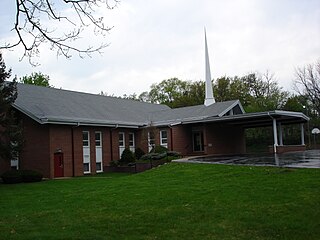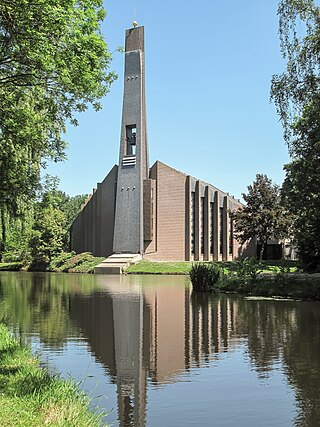The Protestant Church in the Netherlands is the largest Protestant denomination in the Netherlands, being both Calvinist and Lutheran.
Presbyterianpolity is a method of church governance typified by the rule of assemblies of presbyters, or elders. Each local church is governed by a body of elected elders usually called the session, though other terms, such as church board, may apply. Groups of local churches are governed by a higher assembly of elders known as the presbytery or classis; presbyteries can be grouped into a synod, and presbyteries and synods nationwide often join together in a general assembly. Responsibility for conduct of church services is reserved to an ordained minister or pastor known as a teaching elder, or a minister of the word and sacrament.

Continental Reformed Protestantism is a part of the Reformed tradition within Protestantism that traces its origin in the continental Europe. Prominent subgroups are the Dutch Reformed, theGerman Reformed the Swiss Reformed, the French Huguenots, the Hungarian Reformed, and the Waldensian Church in Italy.

The Reformed Church in America (RCA) is a mainline Reformed Protestant denomination in Canada and the United States. It has about 84,957 members. From its beginning in 1628 until 1819, it was the North American branch of the Dutch Reformed Church.

The Heidelberg Catechism (1563), one of the Three Forms of Unity, is a Reformed catechism taking the form of a series of questions and answers, for use in teaching Reformed Christian doctrine. It was published in 1563 in Heidelberg, Germany. Its original title translates to Catechism, or Christian Instruction, according to the Usages of the Churches and Schools of the Electoral Palatinate. Commissioned by the prince-elector of the Electoral Palatinate, it is sometimes referred to as the 'Palatinate Catechism.' It has been translated into many languages and is regarded as one of the most influential of the Reformed catechisms. Today, the Catechism is 'probably the most frequently read Reformed confessional text worldwide.'

The Christian Reformed Church in North America is a Protestant Calvinist Christian denomination in the United States and Canada. Having roots in the Dutch Reformed Church of the Netherlands, the Christian Reformed Church was founded by Dutch immigrants in 1857 and is theologically Calvinist.
The Dutch Reformed Church was the largest Christian denomination in the Netherlands from the onset of the Protestant Reformation in the 16th century until 1930. It was the traditional denomination of the Dutch royal family and the foremost Protestant denomination until 2004, the year it helped found and merged into the Protestant Church in the Netherlands. It was the larger of the two major Reformed denominations, after the Reformed Churches in the Netherlands was founded in 1892. It spread to the United States, South Africa, Indonesia, Sri Lanka, Brazil, and various other world regions through Dutch colonization. Allegiance to the Dutch Reformed Church was a common feature among Dutch immigrant communities around the world and became a crucial part of Afrikaner nationalism in South Africa.
The United Reformed Churches in North America (URCNA) is a theologically conservative federation of Reformed churches founded in 1996. Many churches joined the URCNA after splitting from the Christian Reformed Church in North America denomination.
Mercersburg theology was a German-American theological movement that began in the mid-19th century. It draws its name from Mercersburg, Pennsylvania, home of Marshall College from 1836 until its merger with Franklin College in 1853, and also home to the seminary of the Reformed Church in the United States (RCUS) from 1837 until its relocation to Lancaster in 1871.
The Christian Reformed Churches of Australia (CRCA), formerly known as the Reformed Churches of Australia (RCA) is a Christian denomination established in Australia belonging to the Reformed/Presbyterian tradition.

The Evangelical and Reformed Church (E&R) was a Protestant Christian denomination in the United States. It was formed in 1934 by the merger of the Reformed Church in the United States (RCUS) with the Evangelical Synod of North America (ESNA). A minority within the RCUS remained out of the merger in order to continue the name Reformed Church in the United States. In 1957, the Evangelical and Reformed Church merged with the majority of the Congregational Christian Churches (CC) to form the United Church of Christ (UCC).

The Protestant Reformed Churches in America is a Protestant denomination of 33 churches and over 8,000 members.

The Netherlands Reformed Congregations is a conservative Calvinist denomination with congregations in Canada, the United States and Bolivia. It is affiliated with the Reformed Congregations in the Netherlands.

The Evangelical Synod of North America (ESNA), before 1927 German Evangelical Synod of North America, was a Protestant Christian denomination in the United States existing from the mid-19th century until its 1934 merger with the Reformed Church in the United States to form the Evangelical and Reformed Church. This church merged with the Congregational Christian Churches in 1957 to create the United Church of Christ.

The Christian Reformed Churches in the Netherlands is a Protestant church in the Netherlands.

The Reformed Churches in the Netherlands (Liberated) (Dutch: Gereformeerde Kerken in Nederland (vrijgemaakt)) was an orthodox Calvinist federation of churches. This church body arose in 1944 out of the so-called Liberation (Vrijmaking) from the Reformed Churches in the Netherlands, when many pastors and members refused to go along with the General Synod's demand to hold to "presumed regeneration of infants" at their baptism. Klaas Schilder played an important role in the Liberation. There were 270 affiliated local congregations with a total of about 120,000 members in 2016.
The Eureka Classis was part of the Reformed Church in the United States (RCUS). It existed from 1910 to 1985. From 1940 until in 1985 the Eureka Classis served as the continuing RCUS as the rest of the denomination had merged into the new denomination, the Evangelical and Reformed Church. On May 6, 1986, the Eureka Classis was called to order and immediately dissolved to form the Synod of the Reformed Church in the United States.
The Calvin Synod is an acting conference of the United Church of Christ, composed entirely of Reformed, or Calvinist congregations of Hungarian descent. Unlike much of the UCC, the Synod is strongly conservative on doctrinal and social matters, and many members of the "Faithful and Welcoming Movement," a renewal group acting to move the UCC in a more orthodox direction, belong to this body.










